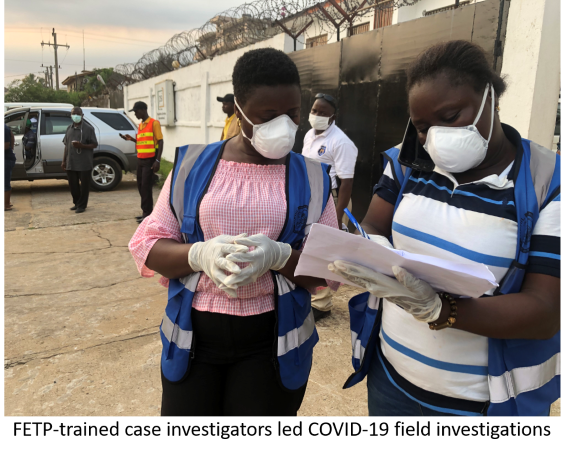PHOTO: FETP grads at work COVID April 2021
Op-Ed by: CAPT Rachel T. Idowu MD MPH (O-6)
Country Director, Centers for Disease Control and Prevention (CDC) Liberia
Agriculture Every day, public health workers across Liberia work faithfully to make sure each Liberian can live in a community that has the capacity to quickly recognize and respond to diseases that can be transmitted person-to-person.
You may not know these people’s names but there may be one or more field epidemiologists (also known as “disease detective” or “disease investigators”) living in your county or your district. On Tuesday, September 7, 2021, many public health leaders, governments, and communities around the world will celebrate the first World Field Epidemiology Day. This is an opportunity to highlight the success of disease detectives that are helping to combat the COVID-19 pandemic in Liberia.
Since 2015, the U.S. Centers for Disease Control and Prevention (CDC), in partnership with the National Public Health Institute of Liberia (NPHIL) and the African Field Epidemiology Network, have trained 246 frontline disease detectives to prevent, detect, and respond to signs of infectious diseases in your communities. They are your district surveillance officers. From 2017 to 2021, an additional 62 higher level disease detectives have been trained and assigned to 15 counties within Liberia as county surveillance officers.
Around the world, more than 19,000 disease detectives have been trained through more than 80 Field Epidemiology Training Programs (FETP), serving over 90 countries and territories. FETP began in 1975, and since 2005 FETP, disease detectives responded to more than 5,500 outbreaks, including Ebola, Zika, yellow fever, cholera, measles, as well as natural disasters around the world.
All these disease detectives are trained to address infectious diseases that come from human, animal, or environmental causes and affect your communities. The disease detectives apply their knowledge of field epidemiology, surveillance, research, and disease prevention/control to reduce the likelihood that illness, injury, or death will affect your families and your community.
The sooner disease detectives recognize the signs of a possible disease outbreak, the sooner they can work with other public health experts to stop a local outbreak from becoming a global pandemic like the current COVID-19 pandemic. So, the important work they do to gather evidence about where, when, and how an outbreak started is the foundation of building a successful response effort.
So, the next time a disease detective happens to come to your village or town asking if you or your family have experienced cough, fever, difficulty breathing, or if you or someone in your family has been in contact with someone who was diagnosed with COVID-19 disease, help them in their efforts to keep you healthy.
Know that these disease detectives are here to help stop the pandemic. They are here to bring their knowledge and skills with them and to help stop the spread of the disease in your community.

